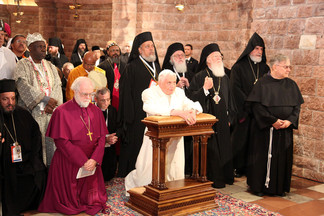
Participation of Catholics in non-Catholic services may happen today in so many ways, and it is so difficult at times to draw the line between lawful and unlawful communication, that it is well before considering these cases to state the general rules that apply here.
- General rules
- It is lawful to perform an act from which two effects follow, one good and the other bad, if the act in itself is good or indifferent if there is a sufficiently grave reason for performing it, if the evil effect is not intended and if the evil effect be not prior to the good effect (see 104).
- Circumstances vary in different localities and countries, and communication that would signify unity of belief in a place where Catholics and non-Catholics are very unequal numerically might be very harmless in a place where there is no great numerical difference. Offence to non-Catholics should not be given needlessly.
- In doubtful cases the decision whether or not a particular kind of communication is lawful or unlawful pertains to the Ordinary (Canon 1258).
- It is lawful to perform an act from which two effects follow, one good and the other bad, if the act in itself is good or indifferent if there is a sufficiently grave reason for performing it, if the evil effect is not intended and if the evil effect be not prior to the good effect (see 104).
- Participation of Catholics in non-Catholic services is either active or passive. (a) Participation is active when one takes a part or fulfils some function in an act that is an official expression of the worship and belief of a sect, even though this takes place outside a church, or is not open to the general public. (b) Participation is passive, if one merely assists as a spectator, and not as a worshipper, at something pertaining to non-Catholic worship.
- Sacred things in which communication is possible are of three classes:
- the chief acts of divine worship (i.e., Sacrifices, Sacraments, sacramentals) ;
- the secondary acts of divine worship (such, as prayers, processions, vows, oaths, the Divine Office, hymn singing, Scripture reading, etc.,.). In the Protestant denominations some one or other of these is, as a rule, the central or distinctive service, although some have other proper features of their own, such as the silent meeting of the Quakers, the seance of the Spiritualists, the march of the Salvation Army, the charity kiss of the Dunkards;
- places (e.g., churches, lodge rooms, cemeteries), times (e.g., days of feast or fast), and objects (e.g., images, badges, aprons, banners, robes), pertaining to divine worship.
- the chief acts of divine worship (i.e., Sacrifices, Sacraments, sacramentals) ;
- It is unlawful for Catholics in any way to assist actively at or take part in the worship of non-Catholics (Canon 1258). Such assistance is intrinsically and gravely evil; for (a) if the worship is non-Catholic in its form (e.g., Mohammedan ablutions, the Jewish paschal meal, revivalistic "hitting the trail," the right hand of fellowship, etc.), it expresses a belief in the false creed symbolised; (b) if the worship is Catholic in form, but is under the auspices of a non-Catholic body (e.g., Baptism as administered by a Protestant minister, or Mass as celebrated by a schismatical priest), it expresses either faith in a false religious body or rebellion against the true Church.
- it is unlawful for Catholics to simulate active assistance in the worship of non-Catholics, for, while the non-Catholic rite would be avoided, something which appeared to be that rite would be done, and thus profession of faith in it would be given.
- Hence, it is not lawful to do an indifferent act which bystanders from the circumstances will have to conclude is an act of false worship. Thus, Eleazar would not eat lawful meat which was put before him in order that he might pretend to eat the meat of sacrifice after the manner of the heathen (II Mach., vi).
- It is not lawful to accept a false certificate of participation in false worship. Hence, the early Church condemned as apostates the Libellaties (i.e., those Christians, who, to protect themselves in time of persecution, obtained by bribery or otherwise a forged or genuine magistrate's certificate that they had sacrificed to the heathen gods).
- Hence, it is not lawful to do an indifferent act which bystanders from the circumstances will have to conclude is an act of false worship. Thus, Eleazar would not eat lawful meat which was put before him in order that he might pretend to eat the meat of sacrifice after the manner of the heathen (II Mach., vi).




